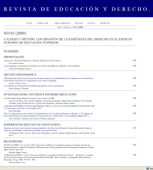The teaching of constitutional law from the local in México.
Article Sidebar

Main Article Content
Luis Eusebio Alberto Avendaño González
Universidad Autónoma de Querétaro.
The teaching of constitutional law in Mexico has been historically limited to the systematic study of the regulations included in the Political Constitution of the Mexican United States of February 5, 1917. The theory, doctrine, and bibliography prevailing, has had as its purpose legitimize the revolutionary principles of that, until the construction of the standard conceptual founding as positive constitutional jurisprudence. In the same sense, the curricula of universities in the training of jurists by applying the method of legal positivism, has led in consequence a teaching "closed", "'s calls" and focusing exclusively on federal spectrum. The reform of June 10, 2011, has helped to meet a legal reality, social and educational environment of the national and the international in the understanding of the federal standard and with this move to the construction of a dogmatic Local Constitutional, where the paradigm of the constitutional law is the exception, that is to say, the study and teaching of constitutional law from the local phenomenon, based on three considerations: a constitutional interpretation based on values, the definition of the powers of the Superior Courts of Justice as local constitutional judges and finally the definition of a legislation in the field of Constitutional Justice Local, forming as a result, a theoretical model own constitutional.
Keywords
Teaching, federal constitutional law, local constitutional law.
Article Details
How to Cite
Avendaño González, Luis Eusebio Alberto. “The teaching of constitutional law from the local in México”. Revista de educación y derecho, no. 10, https://raco.cat/index.php/RED/article/view/281786.
Rights
Copyright
Authors retain copyright and grant the journal the right of first publication.
Texts will be published under a Creative Commons Attribution License that allows others to share the work, provided they include an acknowledgement of the work’s authorship, its initial publication in this journal and the terms of the license.
Author Biography